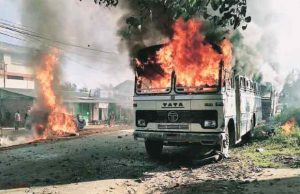
24-12-2016 (Important News Clippings)
To Download Click Here
The Importance Of Being Indian
Our country has more VIPs than any other nation in the whole wide world

Britain reportedly has a total of 84 officially designated VIPs. The French republic boasts 109 such personages, Japan 125, Germany 142, Australia 205, the US 252, South Korea 282, oligarchic Russia 312, and China 435.Leaving such stragglers far behind and in the dust, India has taken an unbeatable lead in what might be termed the Dignitaries Derby by fielding no fewer than 5,79,092 front-runners, and still counting.Besides the president and the vice-president, these include, among others, the governors of all the states, the Speakers of Parliament and assemblies, MPs, MLAs, MLCs, corporators, taluk/ gram panchayat members, party leaders, the chief justice and judges of the Supreme Court and high courts.
Indeed, the creation of VIPs is a growth industry in the country where the diktats of dynastic rule create their own hierarchies – or higher-archies – by the elevation of kith and kin – or should that be kith and king? – to positions of power and prestige.Sceptics might ask how come, with so many very important persons in our midst, we aren’t world leaders in all spheres of activity, from economic and social uplift to sports. Could it be a case of too many cooks – too many crooks? – spoiling the broth?
Such questions miss the point, which is that only too often importance feeds on itself and creates a culture of competitive self-importance, with each contender preoccupied to the exclusion of all else with scoring points over others, be it in a parliamentary logjam over demonetisation or in the impasse as to who calls the shots in poll-bound UP, Number One Son or Number One Uncle.All of which ensures that, our grand panjandrums apart, all the rest of us can also collectively claim another sort of VIP status: Very Insignificant Priorities.
Solar power: More than a sunrise industry

Project developers typically house each project in a distinct special purpose vehicle (SPV). This, in turn, executes the PPA at a predetermined tariff for a predetermined duration, usually 25 years. Even when project execution risks of a typical thermal power project using coal or gas have been mitigated, and assuming a secure PPA is in hand, it continues to be exposed to input (coal or gas) supply and cost risks resulting in an element of unpredictability in its earnings.
For a solar project in similar circumstances, there is guaranteed supply of the input (sunlight) at zero cost for the entire life of the project, resulting in highly predictable and lowrisk profitability. This key differentiating feature makes the risk and return profile of an equity investment in an operational solar project look a lot like a fixed-income instrument. Keep in mind, the global bond market is approximately double the size of its equity counterpart.
This means there is a deep pool of potential investors across the globe who have a natural affinity to the utility-scale solar story in India. However, the two main challenges they have to overcome are developing comfort on the security of PPAs (offtake credit risk) and ascertaining an appropriate entry point into the market. It is with this backdrop that two crucial enabling conditions need to be seen: that of NTPC offtake and the introduction of infrastructure investment trusts (InvIT).
By Gagan Sidhu
Date: 24-12-16
Kudos, Election Commission! These parties just had to go
The Election Commission (EC) has done well to delist 200-odd political parties that have not contested any elections since 2005. Some parties are floated mainly to launder money. They can be used both to avoid tax — make a contribution by cheque, the amount being tax-deductible for the donor and receive it back in cash, political parties not being amenable to scrutiny as to how precisely they spent their money — and to convert black money into white — give a party money in cash, it will pay you by cheque for some fictitious service.
There are 1,786 registered, unrecognised parties now, besides seven national political parties and 58 state parties. Uttar Pradesh, Delhi and Tamil Nadu house the bulk. Only a quarter of the registered parties participated in the 2009 and 2014 general elections. So, the case for delisting parties that exist merely on paper and withdrawing their incometax exemptions is compelling. However, delisting alone will not halt the practice of all political parties mopping up huge amounts of poll funds through unaccounted contributions that, in turn, drives businesses to generate black money. Fund mobilisation and spending of political parties must be made transparent. Registered parties are supposed to file their returns along with their audited accounts, but compliance to tax laws alone will not suffice. Every political party must mandatorily reveal its spending and sources of financing those expenses.Declaring their monthly expenses and showing their sources of income — disaggregated and combined is the way to go. Other political parties and watchdog bodies must be free to challenge the figure — from the local to the national level. The EC must do the last leg of scrutiny to finalise the spending, and quiz political parties for their source of finance.
एक क्षमतावीर बदल सकता है तस्वीर
दलित चेतना के आधार
पांच राज्यों में विधानसभा चुनाव करीब आते ही राजनीतिक दलों में विभिन्न मतदाता समूहों के साथ ही दलितों को खास तौर पर अपनी ओर आकर्षित करने की होड़ है, लेकिन दलित चेतना को समझने के लिए कुछ तथ्यों पर गौर किया जाना आवश्यक है। भारत में आम तौर पर दलित को मात्र एक राजनीतिक समूह माना जाता है। दलित शब्द के इस्तेमाल से दलितों की एक संघर्षरत सामाजिक समूह की छवि बनती है। दलित गहरे रूप से एक सांस्कृतिक समूह हैं। हालांकि कुछ पश्चिमी विद्वानों ने दलितों को संस्कृति विहीन समूह तक बता दिया है। हमने दो तीन वर्ष पहले इलाहाबाद के गोविंद बल्लभ पंत सामाजिक विज्ञान संस्थान की एक बड़ी शोध टीम के साथ मिलकर उत्तर प्रदेश, बिहार, मध्य प्रदेश, उड़ीसा जैसे राज्यों में दलित लोकप्रिय धार्मिक एवं सांस्कृतिक पंथों का अध्ययन किया था। इनमें दलितों के मध्य कबीर पंथ, रविदासपंथ, सतनामी पंथ, महिमा धर्म का अध्ययन किया तो यह देखकर आश्चर्य हुआ कि किस प्रकार इन लोकप्रिय पंथों के प्रभाव में प्राय: दलितों की दैनंदिन संस्कृति, उनका व्यवहार, उनकी बुद्धिमता और उनका लोक विवेक विकसित हुआ है। गांवों में दलित समूह के लोगों से जब हम साक्षात्कार कर रहे थे और इस क्रम में उनके गीत और उनकी कथाएं रिकार्ड कर रहे थे तो आश्चर्यजनक रूप से उनकी वाणी में हमें कबीर, रैदास, गुरु घासीदास, महिमा स्वामी की वाणियां सुनाई पड़ रही थीं। यूपी में उनकी चेतना में स्वामी अछूतानंद के आदि हिंदू पंथ की चेतना का असर भी दिखाई पड़ता है। उनके जन्म से मृत्यु तक के संस्कार, उनके आध्यात्मिक चिंतन इन परिवर्तनकारी संतों एवं पंथों की परंपराओं से बनते दिखे।
हालांकि संतों की जाति नहीं होती, किंतु भक्ति काल में दलित एवं पिछड़ी जातियों में अनेक संत पैदा हुए। रविदास जी, धाना, पीपा जैसे महान संत दलित एवं पिछड़ी जातियों के बीच से ही उभरे। दलितों की संस्कृति पर एक तरफ भक्तिकालीन संतों का प्रभाव है, जिन्होंने उनमें आत्मसम्मान और मानवीय गरिमा का भाव का पैदा किया। यह भी स्पष्ट है कि दलितों के बीच नई जनतांत्रिक संस्कृति पैदा करने में बाबा साहेब अंबेडकर की भी बड़ी भूमिका है। अंबेडकर ने उन्हें संविधान की जद में रहकर एक जनतांत्रिक सामाजिक समूह बनने एवं बने रहने की प्रेरणा दी। अंबेडकर ने उन्हें यह सिखाया कि जनतांत्रिक सम्मानित नागरिक बने रहने के लिए उन्हें क्या-क्या करना है और भारतीय राज्य के साथ उनका संबंध कैसा हो? इस प्रकार दलितों की सामाजिक-सांस्कृतिक चेतना के निर्माण में एक तरफ भक्तिकालीन परिवर्तनकारी पंथों द्वारा पैदा की गई चेतना है तो दूसरी तरफ अंबेडकर द्वारा पैदा की गई चेतना भी है। दोनों की भूमिका महत्वपूर्ण है। एक प्रकार से ये दोनों उनकी चेतना के दो निर्णायक तत्व हैं जिन्हें जोड़ने से ही समग्र दलित चेतना बनती है।
जो राजनीतिक दल सिर्फ अंबेडकर की चेतना एवं परिप्रेक्ष्य से ही दलितों की चेतना को समझना चाहते हैं वे कहीं न कहीं चूकते हैं। इन दोनों में से किसी एक के बिना हम दलित चेतना एवं उनके अंतर्मन की संरचना को अधूरा ही समझ पाएंगे। आरपीआई जैसे संगठन जो मात्र अंबेडकरवादी परिप्रेक्ष्य से ही दलितों को समझना चाहते हैं या उनकी गोलबंदी करना चाहते हैं वे शायद यहीं चूकते हैं। उत्तर प्रदेश में बहुजन समाज पार्टी के संस्थापक कांशीराम शायद इस तथ्य को समझते थे और शायद इसीलिए एक तरफ तो वह छत्तीसगढ़ में विशाल दलित भागीदारी वाले रामनामी मेले में जाकर वहां भाषण देते थे और साथ ही सतनामियों के बीच काम कर बहुजन नेतृत्व विकसित करते थे वहीं दूसरी तरफ वह अंबेडकर के नाम पर लगने वाले मेलों में भी जाते थे। वह उनकी वैचारिकता को सेलेक्टिव ढंग से महत्व देते थे।
कांशीराम अंबेडकर से कई मुद्दों पर विभिन्नता रखते हुए अपनी व्यावहारिक राजनीति विकसित करते थे। एक समय उन पर अंबेडकरवादी बुद्धिजीवियों का दबाव था कि वह बौद्ध धर्म ग्रहण कर लें। वह यह कहते तो रहे कि हां, ग्रहण कर लेंगें, किंतु उन्होंने ऐसा नहीं किया। दरअसल उन्हें पता था कि उत्तर प्रदेश, पंजाब एवं देश के अन्य भागों में दलितों की बहुलांश आबादी कबीरपंथी एवं रविदासी है। शायद कांशीराम जानते थे कि अगर वह बौद्ध धर्म ग्र्रहण करेंगे तो दलितों से जुड़ने की प्रतीकात्मक शक्ति खो देंगे। इसका असर उनकी राजनीति पर पड़ेगा। कांशीराम से दीक्षित मायावती अपनी राजनीति के मध्य चरण तक अपनी सरकार की बड़ी उपलब्धि के रूप में दलित समाज के संतों एवं गुरुओं के सम्मान को बताती रहीं, लेकिन इधर उनके विमर्श में संतों और गुरुओं का नाम आना कम हुआ है। ऐसा क्यों हुआ है? कबीरपंथ और रविदासी पंथ जैसे लोकप्रिय पंथ दलितों में न केवल सांस्कृतिक चेतना पैदा करते हैं, बल्कि वे राजनीतिक चेतना के निर्माण में भी गहरी भूमिका निभाते हैं। आज दलित तेजी से जनतांत्रिक समूह में बदलता जा रहा है। इसकी जमीन इन्हीं लोकप्रिय परिवर्तनकारी पंथों से निर्मित हुई है। इसी जमीन पर ही अंबेडकर ने दलितों के मानस में जनतांत्रिक चाह का वृक्ष रोपा। आत्मसम्मान, मानवीय गरिमा, जाति मुक्ति, समानता जैसी उनकी जनतांत्रिक आकांक्षा इन्हीं पंथों के प्रभाव से उनके मन में, व्यक्तित्व में, सपनों में और आकांक्षाओं में पैदा हुई है।
विभिन्न राज्यों में अपने शोध के दौरान मुझे यह लगातार दिखाई पड़ा कि दलित सदैव राज्य एवं संविधान के साथ चलकर एक जनतांत्रिक नागरिक बने रहना चाहता है। अंबेडकर के प्रभाव में उसका मानस किसी भी हिंसक या संघर्षरत रास्ते से बचते हुए चलना चाहता हैं। वह संवादी जनतांत्रिक नागरिक बने रहना चाहता है। शायद कांशीराम भी इसको समझते थे। एक बार किसी ने उनसे पूछा था कि आप बिहार में अपनी राजनीति क्यों नहीं बढ़ाते? इस पर उन्होंने कहा था कि जहां गोली-बंदूक का प्रभाव होगा वहां हमारी राजनीति कैसे फैलेगी? उन्हें शायद पता था कि दलित मानस एक जनतांत्रिक मानस है और उसे जनतांत्रिक ढंग से ही गोलबंद किया जा सकता है। अपने शोध कार्य के दौरान हमने कई बार यह पाया कि कबीर पंथ के आश्रमों में ठहरे हुए पंथियों में और रविदास आश्रमों में वास करने भक्त श्रद्धालुओं में तथा रविदास मेले में धर्म कर्म के बाद सांझ की पूजा या फिर सत्संग के बाद राजनीतिक चर्चा भी होती है। आप रीवा में कबीर पंथ के एक मठ में कबीर के साथ अंबेडकर की तस्वीर भी दीवार पर टंगी पाएंगे। इस प्रकार ये पंथ उनमें धार्मिक-आध्यात्मिक चेतना विकसित करने के साथ ही उनमें सकारात्मक सामाजिक चेतना भी पैदा करते हैं। जो लोग अंबेडकर को इन पंथों के बनाम या फिर इन पंथों को अंबेडकरवादी चेतना के बनाम रखते हैं उनके बारे में मुझे यही लगता है कि वे दलित आकांक्षा, स्वप्न एवं चेतना को आधा-अधूरा ही समझते हैं।
[ लेखक बद्री नारायण, प्रोफेसर एवं समाज विज्ञानी हैं ]
States of dysfunction
The breakdown of debate in state legislatures must draw more attention and concern
A lament, now disturbingly commonplace, followed the winter session of Parliament. Amid the uproar over demonetisation and demands that Prime Minister Narendra Modi answer the Opposition in the House, the actual business of Parliament — legislation, questions and answers, reasoned debate — suffered. The “least productive” session of both the Rajya Sabha and Lok Sabha in 15 years understandably provoked public scrutiny and criticism. Unfortunately, however, public discourse does not accord the same attention and space to the crisis of the state legislatures.
Just over the last week, three incidents occurred in three different state assemblies that should be cause for concern. On Wednesday, a BJP MLA sat on the Speaker’s chair in the Himachal Pradesh assembly and proceeded to adjourn the House. The treasury benches stared as the Opposition filed out. On Monday, in Tripura, Trinamool Congress MLA Sudip Roy Barman absconded with the Speaker’s mace after the latter did not allow a heated discussion on charges of molestation against a state minister to continue. In Punjab, last Friday, the SAD-BJP government called a day-long special session of the legislature to hurriedly pass nine populist bills with an eye on the upcoming assembly elections — including a Bill to regularise 30,000 contract, adhoc and daily wage employees from various government departments, which will cost the next government about Rs 2,438 crore. That a step of such consequence could take place without extensive debate, or that the office of the Speaker can be so easily disrespected, is deeply disturbing.
Data backs up the anecdotal evidence from last week. According to data compiled by PRS legislative research, the Tripura state assembly met for an average of just 12.4 days per year from 2011-2015 and Himachal Pradesh for just 31. The best performing state, Kerala, also met for an average of a mere 46.7 days a year. The legislatures of federal units face the same difficulties as their Parliament counterparts: Performance in the House has little, if any, bearing on the electoral prospects of a candidate. Acrimonious, polarised debates make smooth functioning and order more difficult and the publicity of a disruption may be more useful than the fruit of a reasoned give-and-take. Unlike Parliament, however, state assemblies face little public scrutiny, and the moral pressure to act in accordance with their purpose and mandate.
राजकीय संकट
अब मणिपुर में जारी नाकेबंदी को बावन दिन हो गए हैं। राज्य में इस नाकेबंदी ने चौतरफा संकट पैदा किया है। लोगों को रोजाना हो रही तकलीफों का कोई अंत नहीं है।

गौरतलब है कि यूएनसी यानी यूनाइटेड नगा काउंसिल ने मणिपुर सरकार के एक फैसले के विरोध में दो राजमार्गों- एनएच-2 (इंफल-दीमापुर) और एनएच-37 (इंफल-जिरिबाम)- पर डेढ़ महीने से भी ज्यादा समय से आवाजाही रोक रखी है। विडंबना यह है कि यूएनसी ने ही अब राज्य में राष्ट्रपति शासन लगाने की मांग की है! ये दोनों राजमार्ग, जो कि बाहरी दुनिया से मणिपुर को जोड़ते हैं, राज्य की जीवनरेखा कहे जाते हैं। इन पर आवाजाही ठप रहने से राज्य को आवश्यक वस्तुओं की आपूर्ति बुरी तरह प्रभावित हुई है। खाद्य पदार्थों से लेकर र्इंधन तक, रोजमर्रा की जरूरत की सारी चीजें मुहाल हो गई हैं। कहीं मिलती भी हैं तो बहुत महंगे दाम पर। कालाबाजारियों की बन आई है। नोटबंदी का दंश तो पूरे देश के लोग महसूस कर रहे हैं, पर मणिपुर में समस्या केवल नगदी की नहीं है, उससे ज्यादा रोजमर्रा की चीजों के दुष्प्राप्य होने की है। राज्य के नौ में से सात जिलों को विभाजित कर सात नए जिले बनाने का इबोबी सिंह सरकार का फैसला एक पुरानी मांग की मंजूरी है; यह उन लोगों को रास आया है जो इन जिलों के तहत आएंगे। मगर यूनाइटेड नगा काउंसिल का कहना है कि यह फैसला नगा बहुल इलाकों की जनसांख्यिकी को बदलने की तरकीब है, जो कि विधानसभा चुनाव के मददेनज़र तजवीज की गई है।
यों मणिुपर के लिए नाकाबंदी कोई नया अनुभव नहीं है। अपनी किसी मांग की खातिर दबाव बनाने के एक हथियार की तरह इसका इस्तेमाल कई बार हो चुका है। वर्ष 2011 में तो कुकी संगठनों की तरफ से हुई नाकाबंदी सौ दिन से ज्यादा चली थी, और बदले में फिर नगाओं ने भी वैसा ही किया था। दबाव डालने के ऐसे हथकंडों से किसी समस्या का हल तो कभी नहीं निकला है न निकल सकता है, उलटे राज्य में तरह-तरह का ध्रुवीकरण जरूर होता रहा है। राज्य के मुख्यमंत्री इबोबी सिंह ने हालात सामान्य बनाने में केंद्र से मदद का अनुरोध किया है, यह याद दिलाते हुए कि यूएनसी आखिरकार एनएससीएन (इसाक-मुइवा) के निर्देश या इशारे पर चलता है, जिसके साथ केंद्र की वार्ता चलती रही है। यह दलील अपने में पर्याप्त हो या नहीं, सभी पक्षों से बातचीत कर हालात सामान्य बनाने का रास्ता निकालना केंद्र का फर्ज जरूर बनता है।




